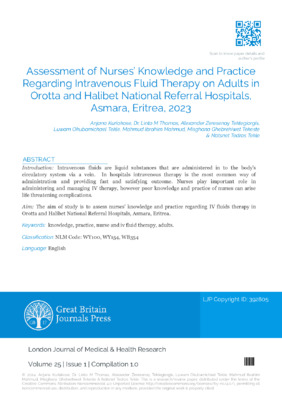Assessment of Nurses Knowledge and Practice Regarding Intravenous Fluid Therapy on Adults in Orotta and Halibet National Referral Hospitals, Asmara, Eritrea, 2023
Keywords:
Multiple Trauma, Accidents, Emergency Medicine., secondary glaucoma, uveitis, posner-schlossman syndrome, intraocular pressure, topical corticosteroids., plasma exchange, Vitamin B12, pernicious anemia, pseudo thrombotic microangiopathy, thrombocytopenic thrombotic purpura, knowledge, Adults, Practice, Nurse and IV fluid therapyAbstract
Introduction: Intravenous fluids are liquid substances that are administered in to the body�s circulatory system via a vein.� In hospitals intravenous therapy is the most common way of administration and providing fast and satisfying outcome. Nurses play important role in administering and managing IV therapy, however poor knowledge and practice of nurses can arise life threatening complications.���
Aim: �The aim of study is to assess nurses� knowledge and practice regarding IV fluids therapy in Orotta and Halibet National Referral Hospitals, Asmara, Eritrea.�
Methodology: Stratified random sampling was used to select the samples in this study. Each ward was taken us strata. Total sample size was 133. This research used a quantitative cross sectional analytical design. The data collection method was self-administered questionnaire and observational checklist. Data was analyzed by using SPSS (Version 26). Descriptive and inferential statistical tests were done as per the need of research objectives.�
Result: The result revealed that The mean (SD) of knowledge of the nurses on IV fluid was 62.29 (11.06) while that of practice was 60.03(11.95). The factors affecting knowledge and practice on IV fluid were determined using independent samples T-test and one way ANOVA. The knowledge score among nurses aged 25 or less was significantly higher than those nurses in the age group 26 or above (t-value=2.086, p=0.039). However, the categories of sex (p=0.149), years of experience (p=0.289), educational level (p=0.376), and further IV therapy training (p=0.915) did not have significantly different knowledge scores. On the other hand, females had significantly higher practice score as compared to males by an average of 5% (t=-1.979, p=0.049). Moreover, at least one of the categories of the educational level was found to have significantly different practice score (F=4.523, p=0.013). However, practice score across the various categories of age (p=0.116), years of experience (p=0.526), further IV therapy training (p=0.791) were not significantly different.�
Conclusion: Nursing practice related to the study concluded that the overall knowledge and practice of nurses has no significant correlation between knowledge and practice. Hence the fact that they have more knowledge does not guarantee more practice by the nurses. The knowledge score among nurses aged 25 or less was significantly higher than those nurses in the age group 26 or above. Therefore, efforts to transform nurses' knowledge into practice is an important concern for educational and awareness programs to improve knowledge and practice changes in regard to IV Fluids Therapy.�
Implication to the field of nursing: - The research findings will enable the organization to develop and organize training programs by identifying the gaps in knowledge and practices of nurses towards IV Fluids Therapy. Efficient knowledge and good practices by the nurses can facilitate patient hospital staying and may contribute to decrease the rate complication IV Fluids Therapy. Moreover, the study results will help for the further research in nursing profession.
References

Downloads
Published
Issue
Section
License
Copyright (c) 2025 Authors and Global Journals Private Limited

This work is licensed under a Creative Commons Attribution 4.0 International License.





